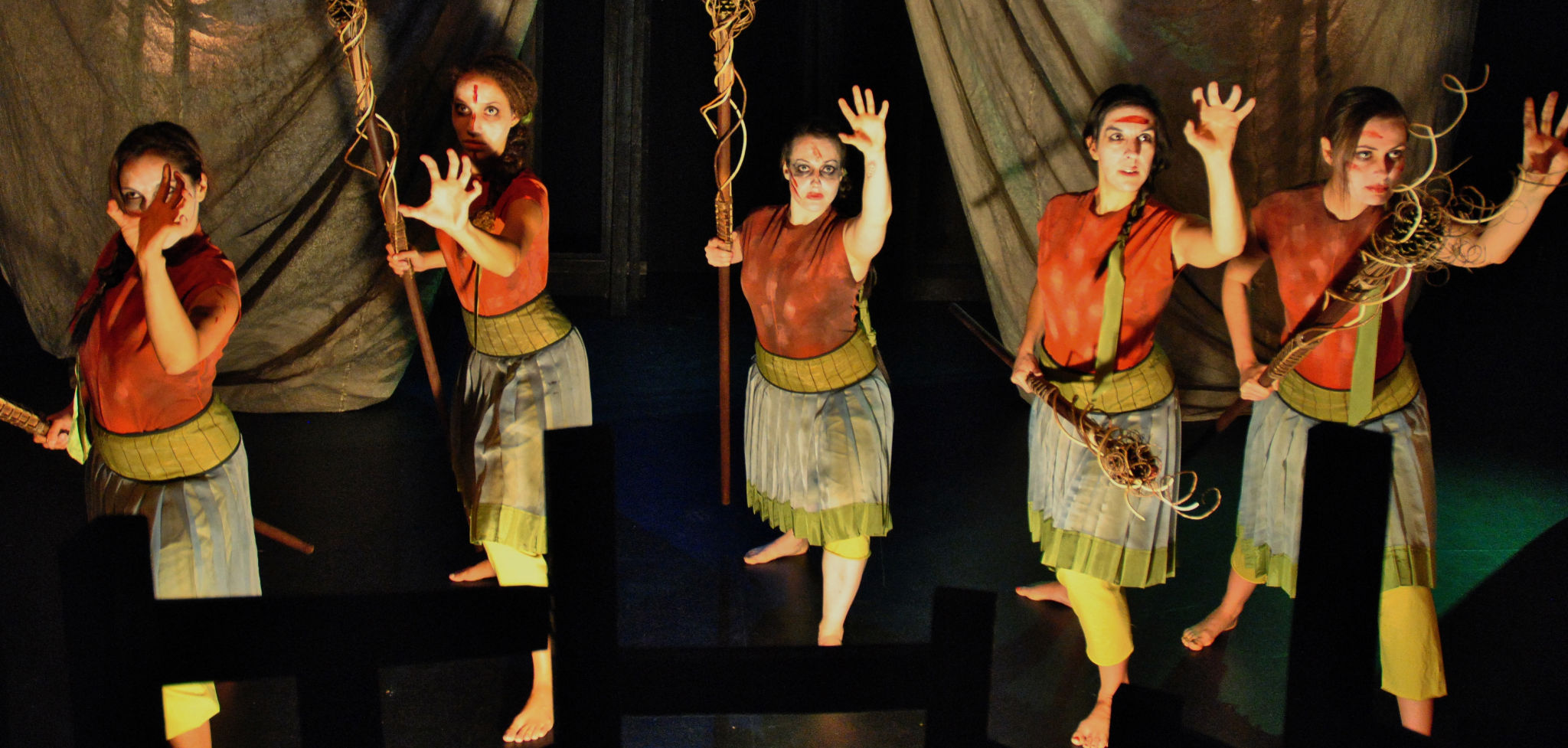It’s been said that art finds its highest form in the Grecian tragedy. After watching The Bacchae, it’s easy to see why. Scapegoat Carnivale’s production of Euripides’ classic benefits from an original translation by director Andreas Apergis and assistant director Joseph Shragge. The resulting textual clarity aided the talented cast in conveying a story convulsing with hubris, violence, and painful horror—a tale that, after nearly 2,500 years, still packs quite a punch.
How is a god born? From another god’s thigh, of course. Dionysus’ mortal mother was killed while he was still a fetus; Zeus’ flesh became the supplemental womb. As if such an experience wasn’t traumatic enough, the entire mortal side of Dionysus’ family rejected him. It’s blasphemy; it’s sacrilege! This is the tale told by the young god at the beginning of the story; teen angst coursing through divine veins is a fearsome sight indeed.
Alex McCooeye’s Dionysus trembles with rage and vengeance that borders on the psychotic. The modern conception of the god of drunken revelry caricatures the original in this regard; McCooeye’s fragile and off-kilter performance reminds us of the frightful wrath of gods.
This wrath is directed towards Thebes, where his mortal family resides. The King, Pentheus, refuses to accept Dionysus’ divine status, even after the women of his city are driven by the god into a frenzied ecstasy. Wolves suckle at their breasts. Milk flows out of the ground when they scratch at it with their fingers. Wild beasts are ripped apart by their bare hands. That Pentheus precipitates his own grizzly doom (though not before a scene of unexpected humour) by wilfully ignoring all this comes at no surprise—this is a Grecian tragedy after all.
Brett Watson’s Pentheus finds a mostly singular note of throttled rage and impotent indignity, though it serves the character well while verbally sparring with the disguised Dionysus. In the latter parts of the play, the now-enraptured noble fully externalizes the fool; Watson fleshes out these dimensions with skill—the subtle sighs and vocal quiverings heighten the comic horror of the moment—but even this results after a transition that is all too brief.
Amongst the supporting cast, Teiresias (Greg Kramer) is a stand-out, dominating his scenes with full-bodied, nuanced enunciation. Equally stunning is the Messenger (Paul Van Dyck). From his lips sprung the most violent and fantastical imagery, more vivid than any graphic representation could ever aspire to achieve. The purity, the monumentality of the terror inspired by Van Dyck’s speech as well as that of the Attendant (Karl Graboshas), are easily the show’s highlights. Agave (France Rolland) is the clearest fusion of oral and physical virtuosity; as the mother of Pentheus, Agave epitomizes anguish in the production, and Rolland fulfils this role with expert precision.
The five-member Greek chorus serves as an amiable interlude to scenes, though ultimately, the whole is greater than the sum of its parts. Harmonization across the vocalists is incredible, euphoric even, but solo segments have mixed results. Brian Lipson’s score—a concoction that oscillates between unremarkable golden hues and contemplative minor dissonance—seems uninspired. Leslie Baker’s choreography is as simple and unvaried as the chorus members’ facial expressions, and its execution sorely lacks synchronicity.
A separate choir at the back of the theatre contributes to a near-surround sound experience—a fantastic decision that could be utilized even more fully. This creative use of the whole of theatrical space is evidenced by the staging of many characters throughout, and is equally beneficial to the performance. Erwann Bernard’s lighting design generally opts for the unobtrusive, and is not without a few moments of thoughtfulness. Francis Farley’s minimalist-yet-functional set design is similarly spartan, and it appropriately allows for the focus to be on the cast itself.
If the goal of Scapegoat Carnivale is the revivification of ancient masterpieces for a contemporary audience, The Bacchae is undoubtedly a success. Traditionally, the play is an important form of ritual worship of Dionysus; I suspect the god of revelry and ecstasy, looking down from Olympus, would be proud of this production.
The Bacchae runs through Oct. 20 at the Centaur Theatre (453 Saint-François-Xavier Rd.) Tickets are $18 for students.







